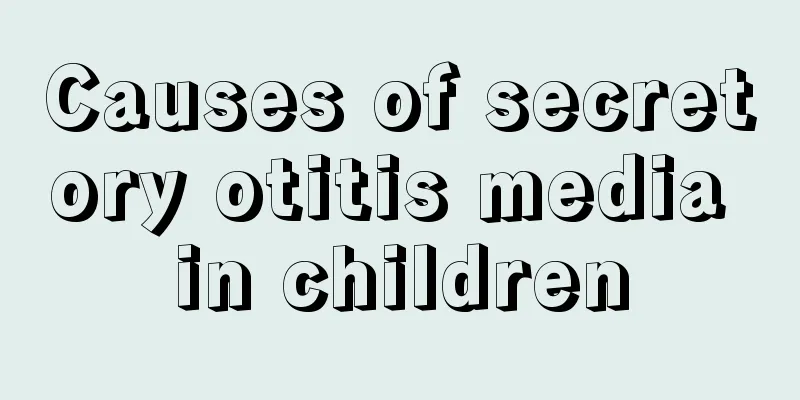What should I do if my child has severe toothache?

|
Toothache is the most common oral disease. Adults can't stand toothache, let alone children. Most children's toothache is caused by tooth decay. We all know that children generally like to eat sweets. If the baby does not rinse his mouth or brush his teeth in time after eating sweets, it is easy to form tooth decay. Parents must control the amount of sweets their children eat and urge their children to maintain good oral hygiene. What should we do if the child has severe toothache? What to do if your child has tooth decay and toothache Most children like to eat sweets and usually do not pay much attention to oral hygiene. Tooth decay has become the number one killer of children's oral health. Tooth decay is a chronic progressive disease with mild early symptoms, which is often not taken seriously and leads to delayed treatment. Once tooth decay reaches the pulp, it will cause severe dental neuralgia, which will then lead to periapical inflammation and mandibular osteomyelitis, affecting the entire body. The pain caused by tooth decay is something that outsiders cannot understand. Pain relief becomes the most urgent problem to be solved for children's tooth decay. Usually children will feel toothache after eating candy, but the pain will go away after rinsing their mouth. Tooth decay at this stage is clinically called medium caries. If pain occurs when responding to hot or cold food, it means that the caries has reached the deep layer of the dentin. So how do you solve the toothache caused by tooth decay? If the tooth decay is minor, it can be repaired by filling it with dental filling materials. Severe tooth decay may require root canal treatment followed by crown restoration surgery. Here are some effective ways to treat tooth decay. First, buy a children's health toothbrush for your child with a small brush head, soft bristles, and rounded and flexible bristle ends. When the child first learns to brush his teeth, parents should demonstrate and patiently teach the child how to brush his teeth correctly. The key to brushing your teeth correctly is to keep the bristles at about 45 degrees to the tooth surface and brush vertically along the gaps between teeth. Brush downward for the upper teeth, upward for the lower teeth, and back and forth in front of the bite. Instead of brushing horizontally in a sawing motion, which can damage teeth and gums. Brush your teeth for 3 minutes each time, once in the morning and once in the evening, and persist in doing so to prevent and treat tooth decay. It is inevitable that children will accidentally ingest toothpaste when learning to brush their teeth, so they must pay attention to the ingredients of toothpaste! Experts point out that after suffering from tooth decay, it is even more necessary to use high-quality fluoride toothpaste. As the saying goes, "it is never too late to mend." Because high-quality fluoride toothpaste can, on the one hand, use fluoride ions to enter the tooth surface, forming a protective layer to help resist the erosion of acidic substances, thereby helping to prevent the deterioration of tooth decay; on the other hand, this fluoride ion can act on other teeth and promote the remineralization of teeth for some potential tooth decay risks, that is, small cavities, and repair these early small cavities to avoid further development and formation of tooth decay. Clinical research results also show that compared with those who use non-fluoride toothpaste, small caries can be significantly repaired in users of fluoride toothpaste. Children's tooth decay usually has the following reasons: 1. It is difficult for children to complete oral hygiene independently; 2. Children have uncontrolled eating habits or their parents indulge them and develop bad habits (such as a love of sweets); 3. The oral environment is naturally acidic (genetics or abnormal saliva secretion). Tooth decay in children is difficult to treat even when taken to the dental department. Deciduous teeth are generally not filled and medication is also avoided. However, if you do not take care of your teeth until they change, the long period of time will cause pulpitis pain, and tooth decay will also make it difficult to change your teeth. It is recommended to use the biotechnology product Tooth Gold No. 2 - Anti-caries Repair Series. Its repair ingredients can directly repair dental plaque and decayed spots on the tooth surface, and add a biological protective layer on the tooth surface to effectively prevent the continuation of decay. It can also promote children's saliva secretion, fundamentally improve the acid-base balance in the mouth, and thus prevent the occurrence of new cavities. More importantly, it is extracted from pure natural plants, does not contain any chemical additives, and will not cause any side effects to children in their growth and development period. It is the safest product. |
<<: What are the precautions for shaving the baby's head?
>>: What should I do if my two-year-old baby has teething pain?
Recommend
What is the BCG vaccination schedule for newborns?
Newborns usually receive BCG vaccination after bi...
Is it normal for little girls to have discharge?
As parents, it is most stressful when a little gi...
The child's face was swollen after being bitten by a mosquito
Children's skin is very delicate. If they are...
At what age do children replace their front teeth?
The baby will grow deciduous teeth half a year af...
How to correct children's picky eating?
Nowadays, many children have varying degrees of p...
Baby's forehead is hot and body temperature is normal
Babies will have some diseases more or less durin...
Prevention of acute bronchitis in children
Bronchitis in children is a very serious problem ...
How to clean up excessive earwax in children
Nowadays, young parents are more concerned about ...
Hearing delay in premature infants
Since premature babies are born before full term,...
Why is my baby breathing heavy?
For babies, no matter what kind of problems the h...
How to treat peeling fingers in children
Some children have problems with their palms, so ...
What are some recipes for home-cooked meals for young children?
In our lives, whether babies can eat healthily is...
How many times does a two-month-old baby poop?
Metabolism is an instinct of our human nature. Th...
Children with elevated lactate dehydrogenase
High lactate dehydrogenase levels in children may...
How to treat the sequelae of encephalitis in babies?
The sequelae of baby meningitis is a rather troub...









